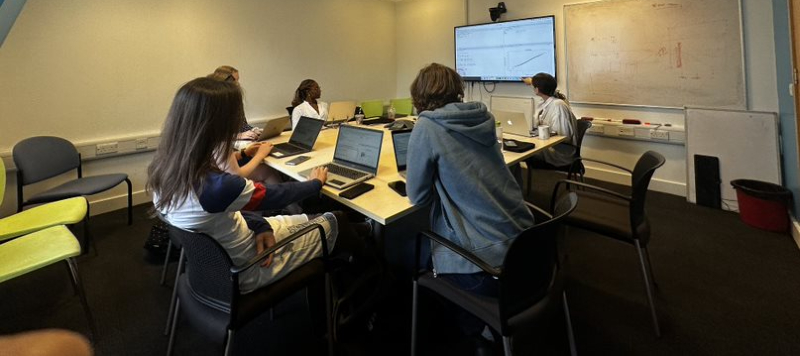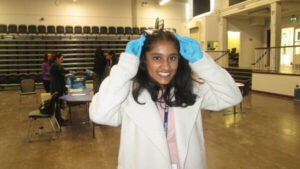A partnership between sixth form students and researchers upskills the students involved, speeds up study recruitment and makes research more relevant.
By Dr Rhiannon Thompson, Research Associate at Imperial College of Science, Technology and Medicine

Rhiannon Thompson
The Study of Cognition, Adolescents and Mobile Phones (SCAMP) looks at how mobile phones and social media impact how young people think and their mental health.
Started in 2014 and based at Imperial College London, it’s the largest of its kind in the world and has been funded by the Medical Research Council (MRC) since 2021. SCAMP researchers recruit people to the study via schools. We have worked with over 10,000 teenagers from 55 London schools.
SCAMP is a longitudinal cohort study which means we collect data from young people over a long period of time. However, as the young people and their lives are constantly changing, we need to keep developing ideas to recruit new people and keep engaging and working with them.
Involving public voices
I joined the study team in 2019 as a Doctor of Philosophy (PhD) student and attended training on public health research which covered public involvement. It was the first time I’d come across the idea of completing research with participants, not just on or for them. I tried to embed this throughout my PhD.
We offer paid opportunities, supported by the main study grant, for young people to join our Young People’s Advisory Group and cohort ambassador programme. Our advisors, aged 16 to 21, have paid roles advising researchers and attend meetings every two months. Our ambassadors are paid ‘research partners’ who promote the study at their school.
During COVID-19 lockdowns, when we were doing everything remotely, schools with ambassadors helped us double the average response rate for our study surveys. The ambassadors effectively tailored their promotion to what they knew about their peers and their school.
To help us recruit new schools and students into the cohort and collect more data, we developed our approach to public involvement further. We tried to think of something we could offer that would give students practical research experience and came up with the idea of a ‘Research Challenge’.

Data analysis workshop at Imperial with research challenge students. Credit: SCAMP study team
How the ‘Research Challenge’ worked
The Research Challenge aimed to help inspire the next generation of researchers and embed young people’s perspectives at every stage of our research. Twelve schools signed up and each nominated small teams of sixth form students. Then we worked with the students to plan and deliver a data collection for the study at their school. Students also submitted their own research questions to answer with the data.
Sixth form students are often thinking about careers, seeking work experience and applying for apprenticeships or university. This programme gives students a useful insight into research by getting them involved in the research cycle and a unique experience to put on their CVs.

School data collection with research challenge students. Credit: SCAMP study team
Activities we ran
We provided training for the students and gave them templates to guide them on how to recruit students and plan their data collection.
It worked brilliantly because the students knew their school and what appealed to their peers. They were creative, using posts on social media, posters, and presentations in assembly.

Research challenge awards ceremony. Credit: SCAMP study team
We went into schools to help the students collect the data, which involved completing a computerised assessment, measuring height, weight, grip and pinch strength, and collecting saliva and urine samples. A team in one school convinced their whole rugby team to give urine samples, which are typically the hardest thing to recruit for.
At the end of the project, we organised an awards ceremony where we presented certificates and prizes to the students. We also selected three of the highest quality research questions and worked with the teams over the summer to analyse them. We’re hoping to be able to publish some of the results with the students.
The impact of public involvement
Helped us recruit more students to take part in the study
It’s the most effective strategy for engagement and recruitment that we’ve developed so far. The students recruited about 1,000 young people in six months to the study, faster than we’ve ever been able to recruit. We’ve been invited back to 11 out of 12 schools this year. It was beneficial for everyone involved and the students and teachers loved it.
Offered students work experience and new skills
We partnered with students in the study and enabled them to co-lead the research at a crucial stage of their professional and personal development. Twenty students who did the Research Challenge in 2022 to 2023 applied to join either our Young People’s Advisory Group or ambassador programme. They’re now working with us in paid roles.
Gave us ideas for new research
The students made our research more relevant to young people and their experiences. Two out of three students’ research questions included things we didn’t plan to look at. For example, how video gaming could impact the flexibility of young people’s thinking.
Made our research more diverse and representative
18% of students received free school meals across our participating schools and the majority of students who took part came from minority ethnic backgrounds. The more representative our research is of London, and its diverse populations, the more value this adds to our data and for the people that our research can potentially impact.
Helped us get funding to scale up our ‘Research Challenge’
Seed funding from MRC helped us deliver prizes and an award ceremony for the Research Challenge, so we could support the students to support us. Based on the success of 2023 we’ve received funding from the Rosetrees Trust exclusively for the Research Challenge, so it’s now going to be scaled up.
Lessons learned
Consider what you can offer
When you care about the people and communities you’re studying, consider what you can offer to benefit them. Focus on what you can offer, rather than what you’re asking for. If what you are offering is mutually beneficial, people are happy to help in return.
Involve people early
Bring in people with lived experience relevant to your work early on. They know what would be interesting and effective better than you do.
Be flexible
Be flexible, open-minded, and prepared to change your approach. We had to strike a balance between giving the students ownership and responsibility, and supporting them when they needed help. When things didn’t go to plan, the students worked out how to improve their teamwork and communication.
Respond to feedback
For the 2024 school year, we’re asking teachers to maintain regular communication with students involved in the Research Challenge and ensure they are fully supported. We’ve added an extra online meeting between the original training session and the data collection for students to ask questions. Suggestions from the students have also helped us improve our presentation for schools to make it more young-people friendly.
Last updated: 28 August 2024
